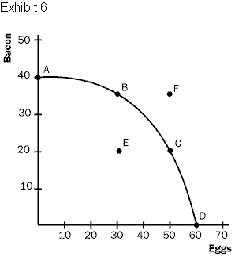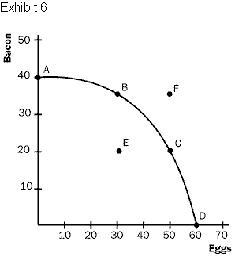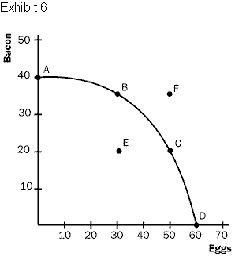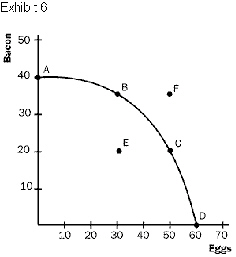True/False
Indicate whether the
sentence or statement is true or false.
|
|
|
1.
|
If an economy is operating on its production
possibilities frontier, it must produce less of one good if it produces more of
another.
|
|
|
2.
|
Points outside the production possibilities
frontier are attainable but inefficient.
|
|
|
3.
|
If an economy were experiencing substantial
unemployment, the economy is producing inside the production possibilities frontier.
|
|
|
4.
|
The production possibilities frontier is bowed
outward because the trade-offs between the production of any two goods are constant.
|
|
|
5.
|
An advance in production technology would cause the
production possibilities curve to shift outward.
|
|
|
6.
|
Macroeconomics is concerned with the study of how
households and firms make decisions and how they interact in specific markets.
|
|
|
7.
|
The statement, "An increase in inflation tends
to cause unemployment to fall in the short run," is normative.
|
|
|
8.
|
When economists make positive statements, they are
more likely to be acting as scientists.
|
|
|
9.
|
Normative statements can be refuted with
evidence.
|
|
|
10.
|
Most economists believe that tariffs and import
quotas usually reduce general economic welfare.
|
Multiple Choice
Identify the
letter of the choice that best completes the statement or answers the question.
|
|
|
11.
|
The scientific method requires that
a. | the scientist be objective. | b. | the scientist use precision equipment. | c. | only correct theories are tested. | d. | only incorrect theories are tested. | e. | the scientist use test tubes and have a clean
lab. |
|
|
|
12.
|
Which of the following is most likely to produce
scientific evidence about a theory?
a. | A lawyer employed by Renault addressing the impact of
air bags on passenger safety. | b. | An economist
permanently employed at a leading university analysing the impact of bank regulations on lending to
small businesses. | c. | An economist
employed by the Trades Union Congress doing research on the impact of trade policy on workers'
wages. | d. | A radio talk show host collecting data from listeners on
how capital markets respond to taxation. |
|
|
|
13.
|
Which of the following is not a factor of
production?
a. | labour | b. | land | c. | money | d. | capital | e. | All of these
answers are factors of production. |
|
|
|
14.
|
Points on the production possibilities frontier
are
a. | inefficient. | b. | normative. | c. | unattainable. | d. | efficient. | e. | none of these
answers. |
|
|
|
15.
|
Which of the following will not shift a
country's production possibilities frontier outward?
a. | an advance in technology | b. | an increase in the labour force | c. | an increase in the capital stock | d. | a reduction in unemployment |
|
|
|
16.
|
Economic growth is depicted by
a. | a shift in the production possibilities frontier
outward. | b. | a movement from inside the curve toward the
curve. | c. | a shift in the production possibilities frontier
inward. | d. | a movement along a production possibilities frontier
toward capital goods. |
|
|
|
17.
|
Refer to Exhibit 6. If the economy is operating at
point C, the opportunity cost of producing an additional 20 units of bacon is

a. | 40 units of eggs. | b. | 10 units of eggs. | c. | 20 units of
eggs. | d. | 30 units of eggs. | e. | 50 units of eggs. |
|
|
|
18.
|
Refer to Exhibit 6. If the economy were operating
at point E,

a. | the opportunity cost of 20 additional units of eggs is
10 units of bacon. | b. | the opportunity
cost of 20 additional units of eggs is 20 units of bacon. | c. | the opportunity cost of 20 additional units of eggs is 30 units of
bacon. | d. | 20 additional units of eggs can be produced with no
impact on bacon production. |
|
|
|
19.
|
Refer to Exhibit 6. Point F represents

a. | none of these answers. | b. | a combination of production that can be reached if we reduce the production of
eggs by 20 units. | c. | a combination of
production that can be reached if there is a sufficient advance in
technology. | d. | a combination of
production that is inefficient because there are unemployed
resources. |
|
|
|
20.
|
Refer to Exhibit 6. As we move from point A to
point D,

a. | the opportunity cost of eggs in terms of bacon
falls. | b. | the opportunity cost of eggs in terms of bacon
rises. | c. | the opportunity cost of eggs in terms of bacon is
constant. | d. | the economy becomes less
efficient. | e. | the economy
becomes more efficient. |
|
|
|
21.
|
Which of the following statements is
normative?
a. | Large government deficits cause an economy to grow more
slowly. | b. | People work harder if the wage is
higher. | c. | The unemployment rate should be
lower. | d. | Printing too much money causes
inflation. |
|
|
|
22.
|
Positive statements are
a. | macroeconomic. | b. | microeconomic. | c. | statements of
description that can be tested. | d. | statements of
prescription that involve value judgments. |
|